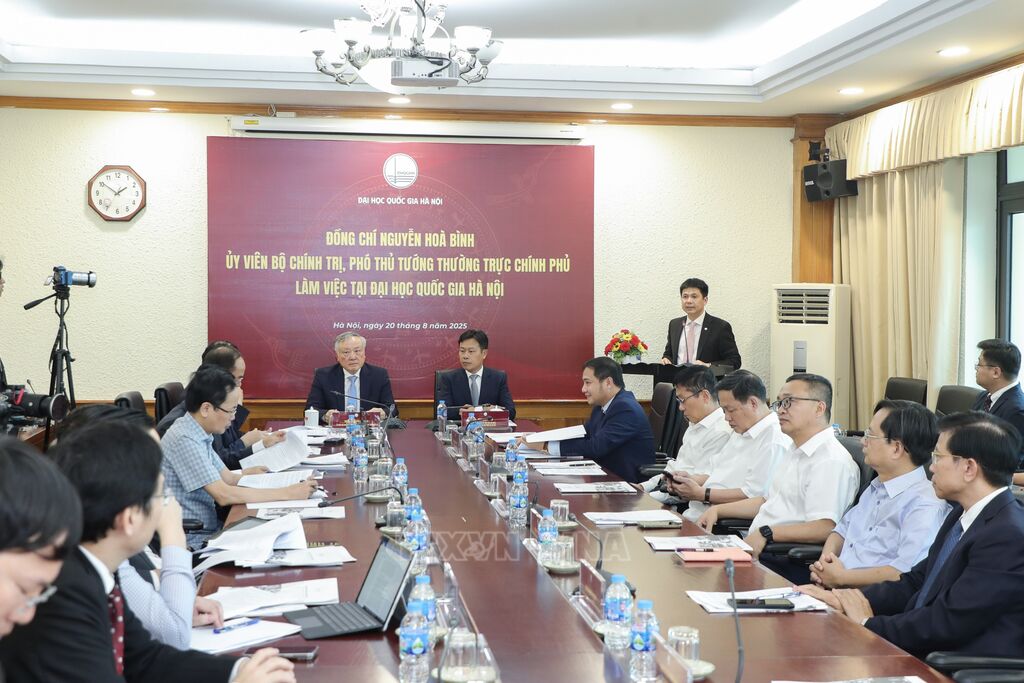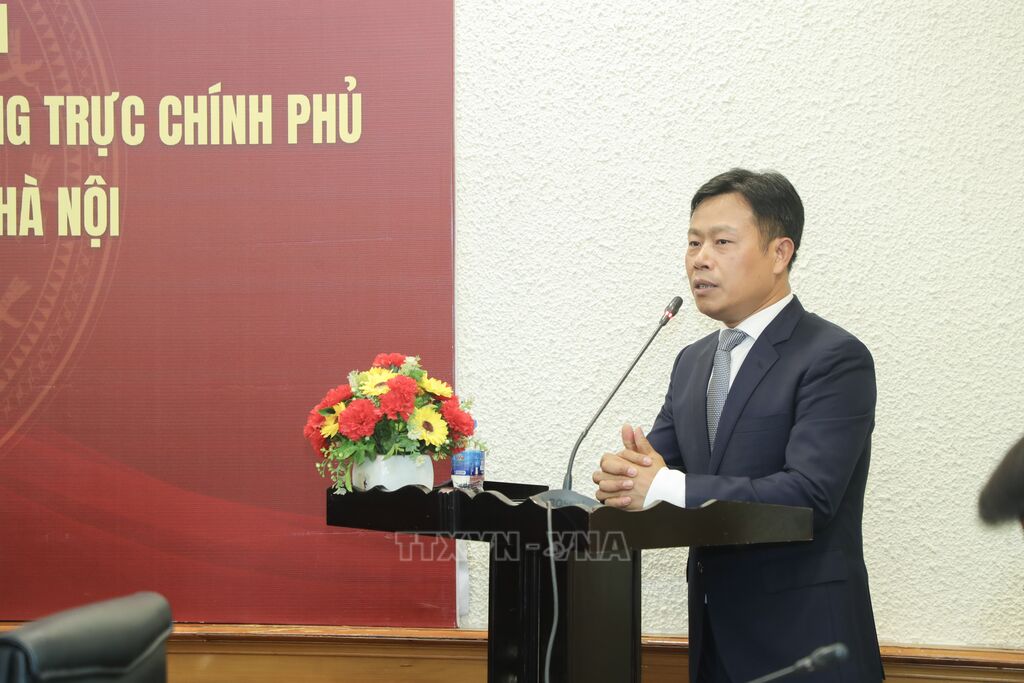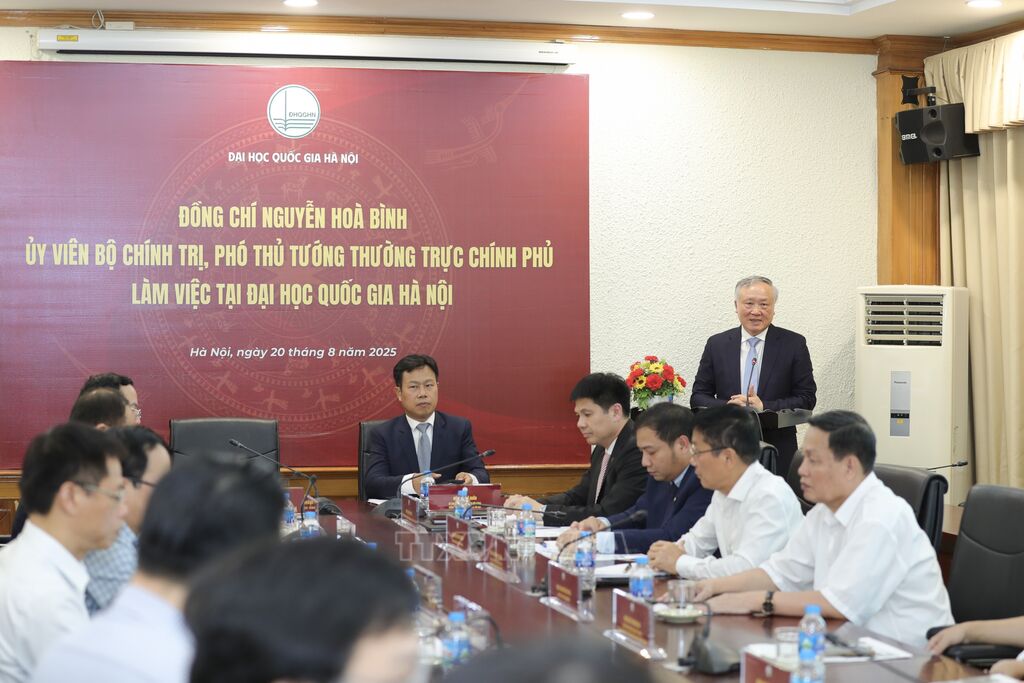On the afternoon of August 20, in Hanoi, Politburo member and Permanent Deputy Prime Minister Nguyen Hoa Binh had a working session with Hanoi National University on the implementation of Resolution No. 18-NQ/TW of the Politburo on continuing to innovate and streamline the political system's apparatus to operate effectively and efficiently; Resolution No. 57-NQ/TW of the Politburo on breakthroughs in science and technology development, innovation and national digital transformation.
Minimize overlap in functions and tasksSharing with Deputy Prime Minister Nguyen Hoa Binh and the working delegation, Director of Hanoi National University Le Quan said: Hanoi National University has always been a pioneer in implementing Resolution 18-NQ/TW, restructuring the organization and streamlining the apparatus, while focusing on developing a research-oriented university model, promoting decentralization and delegation of authority. The school also issued standards for scientists of Hanoi National University, built a set of development indicators associated with the implementation of Resolution 57-NQ/TW; at the same time, established the Center for Technology and Innovation Training.
Director of Hanoi National University Le Quan speaks. Photo: VNA
In particular, Hanoi National University has promoted training in science and technology. Previously, the training quota for these fields only accounted for 16%, but now it has increased to over 40%. In addition, there has been no "brain drain" phenomenon, but has also attracted about 500 more PhDs, professors, and associate professors to teach and research. Revenue from regular expenditure autonomy has grown strongly. The average income of lecturers reached 35.5 million VND/person/month; in which, there are units with an average income of up to 60 million VND/person/month. Along with that, Hanoi National University has put Hoa Lac campus into operation, developed about 46 strong research groups, and established a Development Fund to focus on investment in key areas.
Reporting on the implementation of Resolution 18-NQ/TW, Deputy Director of Hanoi National University Nguyen Hieu said: Hanoi National University has basically completed the arrangement and streamlining of member units and affiliated units, reducing from 36 to 25, reaching a rate of 30.5%; reviewing and adjusting job positions and number of employees; setting a target of streamlining at least 15% of administrative and intermediary staff and reducing at least 20% of staff receiving salaries from the state budget for units that are not financially autonomous.
The reorganization and streamlining of the apparatus at Hanoi National University is carried out in accordance with Resolution 18-NQ/TW, minimizing the overlap of functions and tasks, improving the effectiveness and efficiency of operations and reducing costs. However, Hanoi National University recognizes that there are still limitations in autonomy that have not been institutionalized synchronously, as well as challenges in attracting high-quality human resources due to policy barriers that need to be removed in the coming time to be able to maximize potential.
Implementing Resolution 57-NQ/TW, Hanoi National University has proactively promoted research, transfer and commercialization of research results. The unit has established 3 key research institutes under the High Technology and Innovation Park, including the Institute of Semiconductors and Advanced Materials, the Institute of Quantum Technology and the Institute of Artificial Intelligence in Sustainable Development, with initial important initiatives on semiconductor microchips and quantum technology. Hanoi National University has also approved 8 priority technology fields for the period 2025-2035, and at the same time attracted many leading experts from around the world to advise and lead strategic research institutes.
Hanoi National University focuses on the "3 House" cooperation model (State - School - Enterprise), receiving orders from enterprises worth nearly 50 billion VND, transferring 8 products and currently owning 61 intellectual properties ready for transfer and commercialization.
According to Deputy Director Nguyen Hieu, in the coming time, Hanoi National University will continue to perfect the autonomous model, improve governance efficiency, and pilot excellent research institutes and centers in key areas, striving to have at least 5 units by 2030. The school will also issue specific policies to attract talent, develop an excellent scientific team and promote the mechanism of "ordering" research and policy consulting.
The unit will also increase the application of digital technology and artificial intelligence in human resource management and work performance evaluation, aiming to streamline the apparatus and improve productivity; pilot a salary payment mechanism based on work performance, scientific products, inventions and technology transfer, and establish a high-tech venture capital fund to support applied research activities.
Developing key research areas
Politburo member and Permanent Deputy Prime Minister Nguyen Hoa Binh speaks at the meeting. Photo: VNA
Speaking at the working session, after listening to the report of Hanoi National University on the implementation of two important Resolutions of the Politburo (Resolution 18-NQ/TW and Resolution 57-NQ/TW), Permanent Deputy Prime Minister Nguyen Hoa Binh welcomed and highly appreciated the results achieved in the past time by Hanoi National University, there were very difficult tasks but the unit has done them very effectively and in the right direction.
The Deputy Prime Minister highly appreciated the “neat but sophisticated” steps, especially the establishment of research institutes for semiconductor chips, AI and quantum technology – fields that are still in their infancy in the world but Vietnam has proactively taken a shortcut.
In addition, Hanoi National University has made many strides in linking training with practice, demonstrated through the number of businesses ordering research and recruiting students right at the school. The Deputy Prime Minister said that this is a bright spot, especially in the context of Vietnamese higher education still having limitations of "mismatch" between training and market demand. The Deputy Prime Minister highly appreciated the fact that the school has created a good source of income for lecturers and workers - a dream number for many other universities; at the same time, newly established training majors quickly attract many students, showing the attractiveness of a prestigious training institution. However, to truly assess the quality of education, the Deputy Prime Minister noted that Hanoi National University needs to continue to pay attention to the rate of graduates working in the right profession.
Deputy Prime Minister Nguyen Hoa Binh also said: In the near future, the Politburo will issue a Resolution on breakthroughs in education and training development, expected to be issued before the new school year, with the determination to revive the country's education. In particular, higher education will implement many breakthrough policies, giving stronger autonomy to training institutions.
Therefore, the Deputy Prime Minister requested that Hanoi National University not neglect basic science. In order to develop forward, Vietnam needs to have a foundation in which basic science is a solid launching pad for our country to reach the heights of science and technology. The fact that Hanoi National University is deploying research rooms, institutes, and new fields is in line with the Politburo's orientation on key fields. The Deputy Prime Minister also noted that Hanoi National University continues to pay attention to ensuring the quality of students' output to meet the requirements of the labor market. In addition to training knowledge and expertise, the unit needs to not forget to train Vietnamese personality, culture, civic responsibility, and aspiration to contribute to each student; the example of the teacher also needs to become a standard for students to follow.
The Deputy Prime Minister hopes that Hanoi National University, together with the whole country, will enter a new era with a favorable mindset, meeting the expectations of the Politburo, becoming one of the leading universities in the country and the region, and among the top 200 universities in the world in the near future./.
Vietnam News Agency: Deputy Prime Minister Nguyen Hoa Binh: Hanoi National University "takes shortcuts" to innovation


